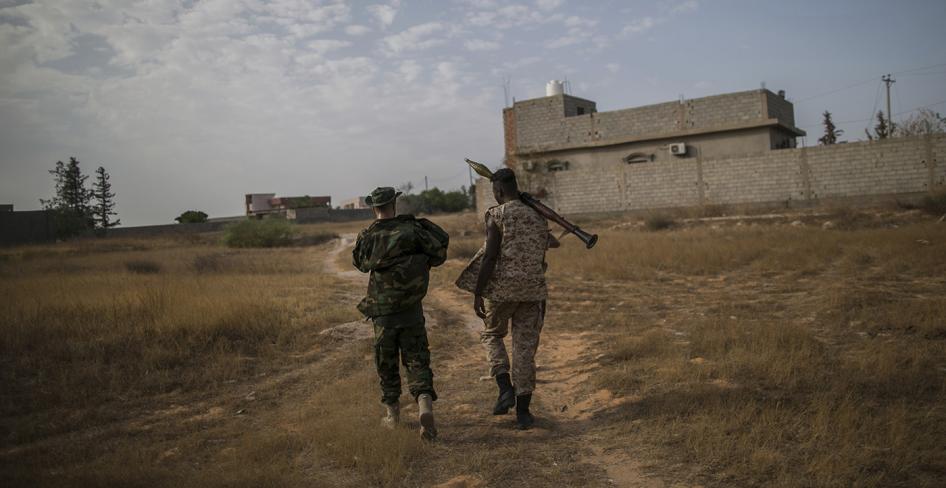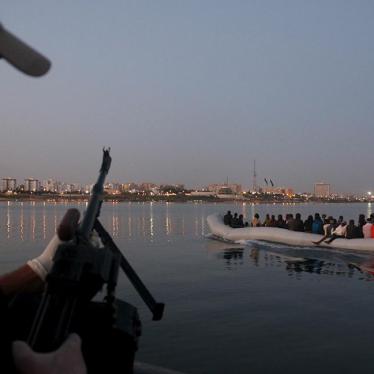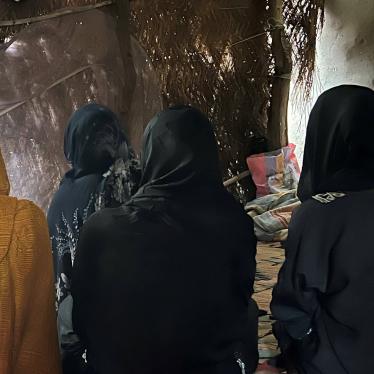(Beirut) – Armed groups loyal to one of two competing Libyan governments and their international backers are putting civilians at risk with indiscriminate attacks, Human Rights Watch said today in its World Report 2020. The United Nations Human Rights Council should establish a Commission of Inquiry to document abuses and identify those responsible with a view to future accountability.
Rival armed groups and their allies have carried out hundreds of drone and air strikes in and around Tripoli since the start of the conflict there in April 2019, killing and displacing civilians. A leaked UN report in November stated that the United Arab Emirates, Turkey, Sudan, and Jordan had repeatedly violated the arms embargo on Libya by supplying weapons, drones, and fighters to the conflict parties. Migrants and asylum seekers remained at high risk of arbitrary detention, ill treatment, and inhumane detention conditions around the country.
“As long as armed groups enjoy impunity, civilians will pay the price,” said Hanan Salah, senior Libya researcher at Human Rights Watch. “Countries aiding the conflict parties should re-think their support for unaccountable and abusive armed groups that could make them complicit in serious human rights abuses.”
In the 652-page World Report 2020, its 30th edition, Human Rights Watch reviews human rights practices in nearly 100 countries. In his introductory essay, Executive Director Kenneth Roth says that the Chinese government, which depends on repression to stay in power, is carrying out the most intense attack on the global human rights system in decades. He finds that Beijing’s actions both encourage and gain support from autocratic populists around the globe, while Chinese authorities use their economic clout to deter criticism from other governments. It is urgent to resist this assault, which threatens decades of progress on human rights and our future.
In April, fighters affiliated with the eastern-based armed group known as Libyan National Army (LNA), under the command of Khalifa Hiftar and affiliated with the Interim Government in the east, attacked armed groups loyal to the Tripoli-based, internationally recognized Government of National Accord (GNA). The LNA received military support from the United Arab Emirates and Jordan in violation of the Libya arms embargo. Foreign fighters from Sudan and Chad also reportedly supported the GNA and LNA, while Russian fighters reportedly supported the LNA. Meanwhile Turkey reportedly supported the GNA with armed drones, while the UAE supported the LNA with armed drones.
The UN estimates the conflict in Tripoli had killed at least 284 civilians and displaced more than 128,000 as of December. According to a leaked UN report, in one incident in June, an airstrike by an unspecified foreign country on a migrant detention center in a compound in Tajoura in the outskirts of Tripoli also used by militias killed over 43 civilians. In another incident, an apparently unlawful air strike on October 14 by LNA forces or their allies killed three small children in their home in Tripoli.
A parliament member, Seham Sergewa, remains missing after an armed group with links to the LNA abducted her from her home in Benghazi in July. Sergewa had been outspoken in opposing the LNA assault on Tripoli.
Several thousand detained migrants and asylum seekers face inhumane conditions in prisons run by the GNA’s Interior Ministry and by smugglers and traffickers, and are at risk of forced labor, beatings, and sexual assault. Support by the European Union and some member states including Italy and France to Libyan authorities to intercept and return migrants to Libya is instrumental in enabling these abuses.
The International Criminal Court (ICC), which has a mandate to investigate war crimes, crimes against humanity, and genocide in Libya since 2011, has issued arrest warrants against Mahmoud al-Werfalli, a Benghazi-based commander affiliated with the Libyan National Army (LNA), for unlawful killings. He remains at large.








